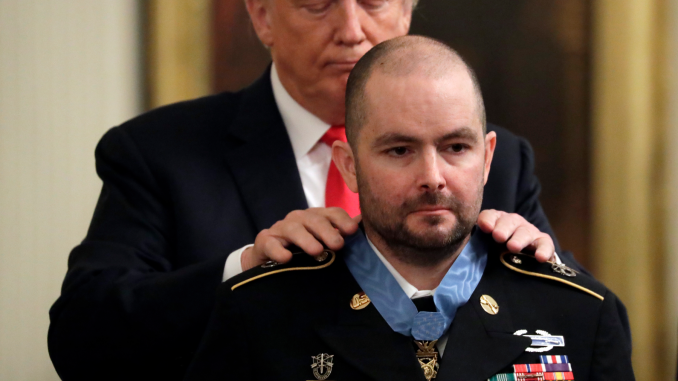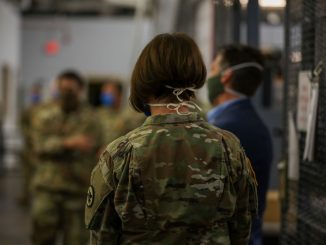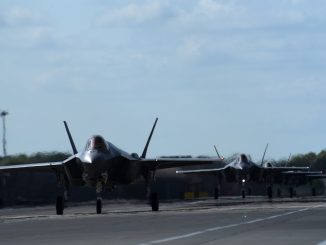

The U.S. Secret Service announced Thursday that former Army Staff Sgt. Ronald J. Shurer, a U.S. Army Special Forces medic who earned the Medal of Honor for heroism in Afghanistan, has died following a protracted battle with lung cancer. He was 41.
Shurer, who concluded his Army service in 2009 and went on to serve in the Secret Service, received the nation’s highest military honor in October 2018. He was diagnosed in 2017 with lung cancer.
He received the Medal of Honor for actions during the Battle of Shok Valley in 2008.
He was initially awarded the Silver Star after the operation, but it was upgraded after a Pentagon review of awards.
Related: 41-Year-Old Medal of Honor Hero Now Faces His Hardest Fight on a New Battlefield
“Today we lost an American Hero: Husband, Father, Son, Medal of Honor Recipient — Special Agent Ronald J. Shurer II,” the Secret Service said on Twitter. “From a grateful Nation and Agency — your memory and legacy will live on forever. Rest In Peace.”
Shurer had joined the Secret Service in 2009, and the agents took immense pride when President Donald Trump awarded him the Medal of Honor on Oct. 1, 2018, jamming the White House East Room for the ceremony.
Shurer had been in and out of hospitals since he was diagnosed with cancer in 2017, but he remained an agent and reported for work when he could.
He posted April 30 on Instagram and Twitter: “Just not having much luck with hospitals lately … Just got admitted again, for difficulty breathing. Home oxygen machines weren’t able to keep me remotely comfortable, so we will see what the hospital can do.”
Shurer posted again May 1: “Just put on Extraction on Netflix. Sitting here, in the icu, in my underwear, eating jello, watching Chris Hemsworth; just how I wanted my Friday evening to go.”
His last post May 13 said that his doctors were going to try something, but “they can’t tell me if it will work.”
Retired Marine Gen. John Kelly, the former White House chief of staff, said Shurer’s service with the military and the Secret Service, and the way he lived his life, posed the unanswerable question: “Where do we get such men?”
“I was standing next to him when he was notified he was to receive the Medal of Honor. I walked with him to the ceremony,” Kelly told Military.com Thursday night. “The last thing he said to me before he walked into the East Room to receive the Medal was that he was only doing his job, that so many others deserved this recognition. That he did not.
“I was honored to meet this man and his wonderful family at the White House,” Kelly said. “He stepped forward twice in his life when he didn’t have to, to serve our country and its people.”
He added that Shurer “was an inspiration in both roles.”
As a Green Beret combat medic in Afghanistan in 2008, Shurer had “looked death in the eyes” and gone about saving “the lives of his buddies who were wounded while the fierce firefight was still ongoing,” Kelly said.
In a lengthy interview with Military.com in January, the soft-spoken Shurer spoke more of the actions of others in the battle of Shok Valley than his own.
He spoke of the Medal as another “responsibility” in a life that he saw as a commitment to meeting responsibilities.
He had a responsibility to other veterans to wear the medal with the respect it deserved.
He had a responsibility to his wife of 13 years, Miranda, and sons Cameron, 12, and Tyler, 8, to be the best husband and father.
He had a responsibility to others battling cancer to console and to help.
He said he would try to explain to others coping with cancer who contacted him that “things can be a little bit scary,” but they should never give up.
As always, it was a team effort with Miranda. “It wouldn’t be right to hide it. We try to help where we can,” he said.
“I know when I first got diagnosed, anybody I could talk to who had some experience at all gave that sense of comfort,” he said. “If I can just do that, it’s too easy to try to help.”
Shurer said he carried with him always the sense of purpose and spirit of team commitment he felt as part of Operational Detachment Alpha 3336 in the Shok Valley.
At an Army news conference prior to his Medal presentation, he said, “I’m not a hero. I just happened to be the medic there that day. The guys trusted me to help them, and I was going to do everything I could not to let them down.”
— Richard Sisk can be reached at Richard.Sisk@Military.com.
Read more: Former VA Doctor Indicted on Charges of Patient Sexual Abuse, Civil Rights Violations
© Copyright 2020 Military.com. All rights reserved. This material may not be published, broadcast, rewritten or redistributed.






Be the first to comment